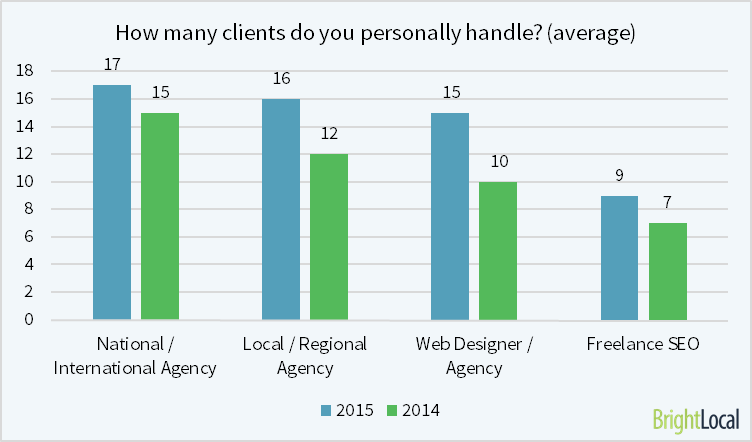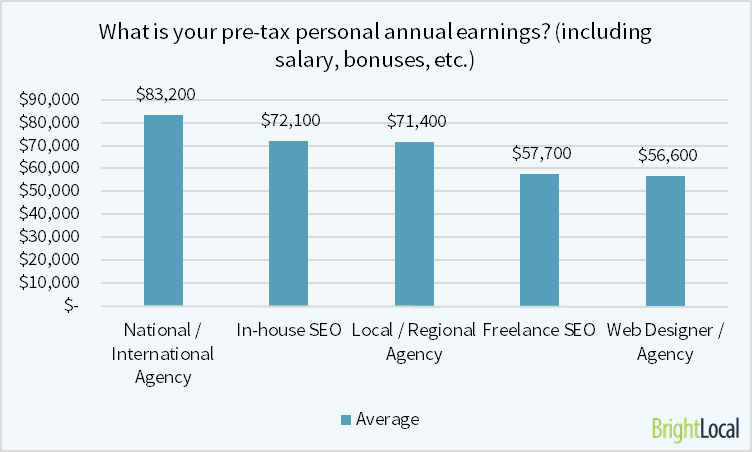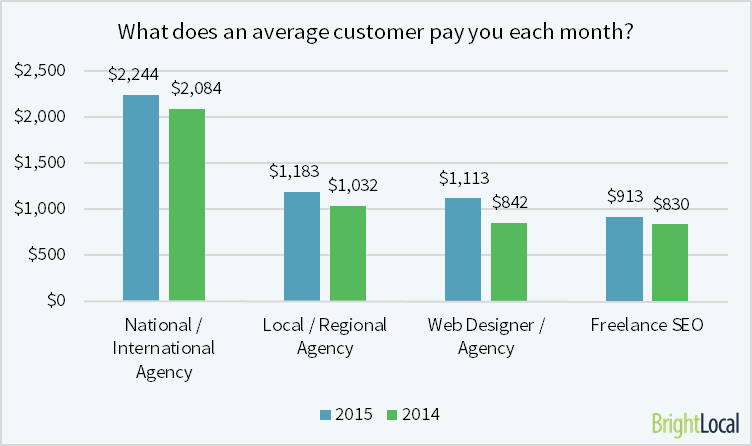Do SEOs At Larger Agencies Earn More Than Those At Smaller Agencies?
Local search practitioners, how do you stack up to your peers in the industry? Columnist Myles Anderson sheds some light on this topic based on data from BrightLocal's recent annual Local SEO Industry Survey.

In December, my company (BrightLocal) published the results of our fourth annual Local SEO Industry Survey. The results gave us the very latest insights into local search, from the perspective of those who work in the industry.
From the 1,972 respondents, there was a largely positive outlook, with 78 percent of SEOs believing that 2016 was going to be a great year for business. However, with respondents coming from many different types AND sizes of businesses/agencies, it’s difficult for SEOs to get a clear benchmark vs. similar businesses.
To make this benchmarking easier, we’ve taken a deeper dive into the data and analyzed the responses for different company types and sizes.
In the survey, respondents identified themselves as working for the following company types/sizes:
- Local or Regional Agencies (aka “Smaller Agencies”) – 34%
- National or International Agencies (aka “Larger Agencies”) – 21%
- Web Designers & Agencies – 16%
- Freelance SEOs – 16%
- In-House SEOs – 13%
We’ve picked out four data points that highlight some significant differences between larger and smaller agencies, web designers, in-house SEOs and freelancers (who provide local search services). To download the full survey breakdown for your business type please head over to BrightLocal.com (registration required for full report download).
What Was Your Company Revenue In The Last 12 Months?
Key Findings:
- Local/Regional Agencies report average revenues of $324,871.
- National/International agencies report 80% higher revenues than smaller agencies – $584,788
*NB – In-House SEOs report the highest company revenue, but as the main business practice of these agencies is not to provide SEO services a direct comparison vs SEO agencies/freelancers is not entirely relevant.
Analysis:
When we focus solely on businesses that provide search marketing services, the average revenues are vastly different, but not unexpected. Agencies that operate on a larger scale clearly make more money than smaller-scale businesses.
Elsewhere in the survey, we saw that large agencies typically employ 7 SEOs (avg.) vs 4 SEOs (avg.) at smaller agencies. This again reflects what we would expect to see given the different size and average revenues from these businesses.
Freelance SEOs reported average “company” revenues of $87,399 (see personal earnings stats in chart 3 below). This is approximately one-quarter of the revenue that small (local/regional) agencies make, so there is a big revenue jump from Freelance to Agency.
So should Freelance SEOs be looking to make that step up and establish an agency? Does the extra revenue translate to greater personal income – see chart 3 below for confirmation!
FYI, in an online poll we ran in October we found that 43% of SEOs planned to start their own agency one day.
How Many Clients Do You Personally Handle?
Key Findings:
- SEOs at larger agencies handle 17 clients, on average (vs 15 in 2014).
- SEOs at smaller agencies handle 16 clients, on average (vs 12 in 2014).
- Freelancers handle nine clients, on average (vs 7 in 2014).
Analysis:
Across the board, SEOs at all types of companies are handling more clients year on year. And it is web designers and smaller agencies that have seen the biggest increases year on year — jumping from 10 to 15 clients.
An SEO at a larger agency handles almost double the number of clients as a freelance SEO, which makes you consider what types of tasks are being tackled day to day in both scenarios.
Of course, freelancers have the freedom and satisfaction (hopefully!) of working for themselves, but they are also responsible for their own business growth; this often includes self-marketing, winning new clients, accounting tasks and so on. SEOs at Larger agencies may escape some of these indirect tasks, but they are also under considerable daily pressure to deliver results for larger scale clients.
In that sense, both types of SEOs may look to each other with envious glances from time to time.
What Are Your Pre-Tax Personal Annual Earnings?
Key Findings:
- SEOs at larger agencies have the highest average personal earnings ($83,200 p.a.).
- Web designers earn the least of all survey participants ($56,600 p.a.)
Analysis:
Earlier, we noted that SEOs at larger agencies personally handle more clients than others, and now we can see that they also earn a considerable amount more. This pre-tax figure includes not just salary but also bonuses, and it’s likely that bonus schemes at larger agencies are more common and invariably higher.*
*NB – If readers are comfortable commenting on this, I’d love to know more about bonus structure and scale where you work, and of course the type of business you’re in. Reach me on Twitter, on Search Engine Land’s Facebook page or in the site’s LinkedIn group.
If we compare Larger Agencies vs. Smaller Agencies, SEOs at larger agencies earn an average of $83,200, whilst those at smaller agencies earn $71,400 — a difference of $11,800. That’s pretty significant.
However, despite this difference, larger agency SEOs only handle one extra client; food for thought for any ambitious regional/local SEOs.
Some further clarification, the median pre-tax earnings for local search marketers are listed below:
- National/International Agency: $60,000 – $75,000
- In-house SEO: $45,000 – $60,000
- Local/Regional Agency: $45,000 – $60,000
- Freelance SEO: $30,000 – $45,000
- Web Designer/Agency: $30,000 – $45,000
What Does An Average Customer Pay You Each Month?
Key Findings:
- Larger agencies command the highest monthly fees from clients (average of $2,244).
- Freelance SEOs receive the lowest monthly fees ($913, on average).
Analysis:
The reason SEOs at large agencies can personally earn a lot more than other SEOs is that their employers, too can earn a lot more in monthly fees from clients.
Large agencies can charge almost double the amount of their smaller counterparts, but we can expect this to reflect the type and scale of clients being worked with, who will invariably have larger operations, possibly more locations and certainly bigger marketing budgets.
Solid reputation, a proven track record of success (particularly with clients of similar stature) and often industry contacts are key attributes to securing larger business clients, which does give larger agencies an advantage… often making it difficult for smaller agencies to compete.
Contributing authors are invited to create content for Search Engine Land and are chosen for their expertise and contribution to the search community. Our contributors work under the oversight of the editorial staff and contributions are checked for quality and relevance to our readers. The opinions they express are their own.
Related stories
New on Search Engine Land



